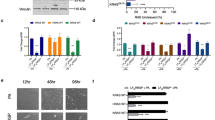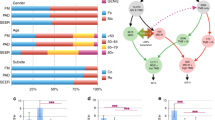Abstract
Kras is commonly mutated in colon cancers, but mutations in Nras are rare. We have used genetically engineered mice to determine whether and how these related oncogenes regulate homeostasis and tumorigenesis in the colon. Expression of K-RasG12D in the colonic epithelium stimulated hyperproliferation in a Mek-dependent manner. N-RasG12D did not alter the growth properties of the epithelium, but was able to confer resistance to apoptosis. In the context of an Apc-mutant colonic tumor, activation of K-Ras led to defects in terminal differentiation and expansion of putative stem cells within the tumor epithelium. This K-Ras tumor phenotype was associated with attenuated signaling through the MAPK pathway, and human colon cancer cells expressing mutant K-Ras were hypersensitive to inhibition of Raf, but not Mek. These studies demonstrate clear phenotypic differences between mutant Kras and Nras, and suggest that the oncogenic phenotype of mutant K-Ras might be mediated by noncanonical signaling through Ras effector pathways.
This is a preview of subscription content, access via your institution
Access options
Subscribe to this journal
Receive 12 print issues and online access
$209.00 per year
only $17.42 per issue
Buy this article
- Purchase on Springer Link
- Instant access to full article PDF
Prices may be subject to local taxes which are calculated during checkout






Similar content being viewed by others
References
Vogelstein, B. et al. Genetic alterations during colorectal-tumor development. N. Engl. J. Med. 319, 525–532 (1988).
Malumbres, M. & Barbacid, M. RAS oncogenes: the first 30 years. Nat. Rev. Cancer 3, 459–465 (2003).
Campbell, S.L., Khosravi-Far, R., Rossman, K.L., Clark, G.J. & Der, C.J. Increasing complexity of Ras signaling. Oncogene 17, 1395–1413 (1998).
Haigis, K., Sage, J., Glickman, J., Shafer, S. & Jacks, T. The related retinoblastoma (pRb) and p130 proteins cooperate to regulate homeostasis in the intestinal epithelium. J. Biol. Chem. 281, 638–647 (2006).
Tuveson, D.A. et al. Endogenous oncogenic K-ras(G12D) stimulates proliferation and widespread neoplastic and developmental defects. Cancer Cell 5, 375–387 (2004).
Wong, M.H., Saam, J.R., Stappenbeck, T.S., Rexer, C.H. & Gordon, J.I. Genetic mosaic analysis based on Cre recombinase and navigated laser capture microdissection. Proc. Natl. Acad. Sci. USA 97, 12601–12606 (2000).
Downward, J. Targeting RAS signalling pathways in cancer therapy. Nat. Rev. Cancer 3, 11–22 (2003).
Marshman, E., Booth, C. & Potten, C.S. The intestinal epithelial stem cell. Bioessays 24, 91–98 (2002).
Sebolt-Leopold, J.S. et al. Blockade of the MAP kinase pathway suppresses growth of colon tumors in vivo. Nat. Med. 5, 810–816 (1999).
Wolfman, J.C., Palmby, T., Der, C.J. & Wolfman, A. Cellular N-Ras promotes cell survival by downregulation of Jun N-terminal protein kinase and p38. Mol. Cell. Biol. 22, 1589–1606 (2002).
Shirasawa, S., Furuse, M., Yokoyama, N. & Sasazuki, T. Altered growth of human colon cancer cell lines disrupted at activated Ki-ras. Science 260, 85–88 (1993).
Keller, J.W. et al. Oncogenic K-RAS subverts the antiapoptotic role of N-RAS and alters modulation of the N-RAS:gelsolin complex. Oncogene 26, 3051–3059 (2007).
Keller, J.W. et al. Oncogenic KRAS provides a uniquely powerful and variable oncogenic contribution among RAS family members in the colonic epithelium. J. Cell. Physiol. 210, 740–749 (2007).
He, X.C. et al. PTEN-deficient intestinal stem cells initiate intestinal polyposis. Nat. Genet. 39, 189–198 (2007).
Potten, C.S. et al. Identification of a putative intestinal stem cell and early lineage marker; musashi-1. Differentiation 71, 28–41 (2003).
Pouyssegur, J., Volmat, V. & Lenormand, P. Fidelity and spatio-temporal control in MAP kinase (ERKs) signalling. Biochem. Pharmacol. 64, 755–763 (2002).
Rinehart, J. et al. Multicenter phase II study of the oral MEK inhibitor, CI-1040, in patients with advanced non-small-cell lung, breast, colon, and pancreatic cancer. J. Clin. Oncol. 22, 4456–4462 (2004).
Solit, D.B. et al. BRAF mutation predicts sensitivity to MEK inhibition. Nature 439, 358–362 (2006).
McDermott, U. et al. Identification of genotype-correlated sensitivity to selective kinase inhibitors by using high-throughput tumor cell line profiling. Proc. Natl. Acad. Sci. USA 104, 19936–19941 (2007).
Wilhelm, S.M. et al. BAY 43–9006 exhibits broad spectrum oral antitumor activity and targets the RAF/MEK/ERK pathway and receptor tyrosine kinases involved in tumor progression and angiogenesis. Cancer Res. 64, 7099–7109 (2004).
Fearon, E.R. & Vogelstein, B. A genetic model for colorectal tumorigenesis. Cell 61, 759–767 (1990).
Janssen, K.P. et al. Targeted expression of oncogenic K-ras in intestinal epithelium causes spontaneous tumorigenesis in mice. Gastroenterology 123, 492–504 (2002).
Sansom, O.J. et al. Loss of Apc allows phenotypic manifestation of the transforming properties of an endogenous K-ras oncogene in vivo. Proc. Natl. Acad. Sci. USA 103, 14122–14127 (2006).
Guerra, C. et al. Tumor induction by an endogenous K-ras oncogene is highly dependent on cellular context. Cancer Cell 4, 111–120 (2003).
Jackson, E.L. et al. Analysis of lung tumor initiation and progression using conditional expression of oncogenic K-ras. Genes Dev. 15, 3243–3248 (2001).
Holt, K.H., Kasson, B.G. & Pessin, J.E. Insulin stimulation of a MEK-dependent but ERK-independent SOS protein kinase. Mol. Cell. Biol. 16, 577–583 (1996).
Leicht, D.T. et al. Raf kinases: function, regulation and role in human cancer. Biochim. Biophys. Acta 1773, 1196–1212 (2007).
Johnson, L. et al. K-ras is an essential gene in the mouse with partial functional overlap with N-ras. Genes Dev. 11, 2468–2481 (1997).
Esteban, L.M. et al. Targeted genomic disruption of H-ras and N-ras, individually or in combination, reveals the dispensability of both loci for mouse growth and development. Mol. Cell. Biol. 21, 1444–1452 (2001).
Potenza, N. et al. Replacement of K-Ras with H-Ras supports normal embryonic development despite inducing cardiovascular pathology in adult mice. EMBO Rep. 6, 432–437 (2005).
Voice, J.K., Klemke, R.L., Le, A. & Jackson, J.H. Four human ras homologs differ in their abilities to activate Raf-1, induce transformation, and stimulate cell motility. J. Biol. Chem. 274, 17164–17170 (1999).
Parikh, C., Subrahmanyam, R. & Ren, R. Oncogenic NRAS, KRAS, and HRAS exhibit different leukemogenic potentials in mice. Cancer Res. 67, 7139–7146 (2007).
Saam, J.R. & Gordon, J.I. Inducible gene knockouts in the small intestinal and colonic epithelium. J. Biol. Chem. 274, 38071–38082 (1999).
el Marjou, F. et al. Tissue-specific and inducible Cre-mediated recombination in the gut epithelium. Genesis 39, 186–193 (2004).
Colnot, S. et al. Colorectal cancers in a new mouse model of familial adenomatous polyposis: influence of genetic and environmental modifiers. Lab. Invest. 84, 1619–1630 (2004).
Ventura, A. et al. Cre-lox-regulated conditional RNA interference from transgenes. Proc. Natl. Acad. Sci. USA 101, 10380–10385 (2004).
Acknowledgements
The authors thank A. Charest and A. Shaw for critically reading the manuscript, A. Ventura, J. Keller and U. McDermott for technical advice and D. Lauffenburger and M. McMahon for helpful discussion. This work was supported by US National Institutes of Health grants U01-CA84306 and U54-CA112967 to T.J., K01-CA118425 to K.H., and U01-CA84221 and R01-CA72614 to K.S., grants from the Association pour la Recherche sur le Cancer, Ligue Nationale Contre le Cancer, and Inserm to M.G., and partially by the Cancer Center Support (Core) grant P30-CA14051 from the National Cancer Institute. K.H. was a Robert Black Fellow of the Damon Runyon Cancer Research Foundation and was supported by a Career Development award from the Harvard GI SPORE grant from the National Cancer Institute (P50-CA127003). T.J. is a Howard Hughes Medical Institute Investigator and a Daniel K. Ludwig Scholar. The content of this manuscript is solely the responsibility of the authors and does not necessarily represent the official views of the National Cancer Institute or the National Institutes of Health.
Author information
Authors and Affiliations
Contributions
K.M.H. and T.J. conceived and designed the experiments. K.M.H., K.R.K., Y.W., A.C., M.C.H. and A.S.-C. performed the experiments. J.N.G. consulted on pathological analysis of samples. K.M.H. and T.J. analyzed the data. M.N.-K. and M.G. generated and provided conditionally mutant Apc mice. J.S.-L. and K.M.S. provided CI-1040. J.S. provided AZ628 and Sorafenib. K.M.H. and T.J. wrote the manuscript.
Corresponding author
Ethics declarations
Competing interests
Judith Sebolt–Leopold is a former employee and shareholder of Pfizer, the maker of CI–1040
Supplementary information
Supplementary Text and Figures
Supplementary Note, Supplementary Methods, Supplementary Table 1, Supplemenary Figures 1–4 (PDF 5123 kb)
Rights and permissions
About this article
Cite this article
Haigis, K., Kendall, K., Wang, Y. et al. Differential effects of oncogenic K-Ras and N-Ras on proliferation, differentiation and tumor progression in the colon. Nat Genet 40, 600–608 (2008). https://doi.org/10.1038/ng.115
Received:
Accepted:
Published:
Issue Date:
DOI: https://doi.org/10.1038/ng.115
This article is cited by
-
Sleeping Beauty transposon mutagenesis in mouse intestinal organoids identifies genes involved in tumor progression and metastasis
Cancer Gene Therapy (2024)
-
Oncogenic RAS promotes leukemic transformation of CUX1-deficient cells
Oncogene (2023)
-
Sleeping Beauty transposon mutagenesis identified genes and pathways involved in inflammation-associated colon tumor development
Nature Communications (2023)
-
13C tracer analysis suggests extensive recycling of endogenous CO2 in vivo
Cancer & Metabolism (2022)
-
Enhanced BRAF engagement by NRAS mutants capable of promoting melanoma initiation
Nature Communications (2022)



